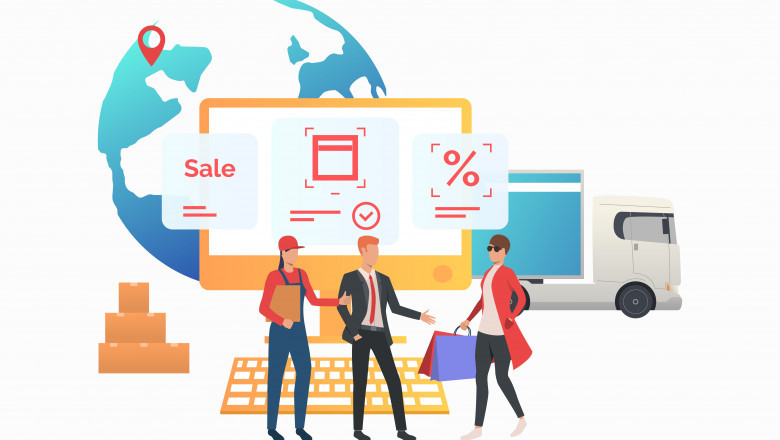views
Automation is revolutionizing the way businesses operate. With the rapid advancements in technology, AI-driven solutions have become central to transforming and streamlining processes across industries. From reducing costs to improving efficiency, AI development solutions offer businesses the ability to automate mundane, time-consuming tasks, freeing up valuable resources for more strategic initiatives. This article explores the role of AI development solutions in automating business processes, the benefits they bring, and key examples of their impact across different sectors.
Understanding AI in Business Process Automation
AI, or Artificial Intelligence, is a broad field of technology that uses algorithms, machine learning, and data analytics to simulate human intelligence. In the context of business process automation (BPA), AI-driven solutions utilize these capabilities to handle repetitive, rule-based tasks, analyze complex data, and even make predictive decisions. As a result, businesses can move away from traditional, manual processes and adopt an agile, data-driven approach that reduces errors, saves time, and enhances productivity.
Key Areas Where AI Automates Business Processes
AI development solutions play a crucial role in transforming business operations by automating various tasks across departments. Below are some of the areas where AI-driven automation has the most significant impact:
-
Customer Service and Support
-
AI-powered chatbots and virtual assistants can handle customer inquiries, answer FAQs, and provide personalized support 24/7. This not only reduces response times but also ensures a consistent customer experience. With natural language processing (NLP), these AI tools can understand and respond to customer queries in real time, significantly reducing the workload on customer service teams.
-
Human Resources and Recruitment
-
AI tools automate repetitive tasks in hiring, such as screening resumes, scheduling interviews, and analyzing candidate data. By using AI to filter applications based on set criteria, HR teams can focus on engaging with the most qualified candidates. Additionally, AI can monitor employee engagement, analyze performance metrics, and assist in training programs.
-
Supply Chain and Inventory Management
-
With AI algorithms, businesses can predict demand more accurately, optimize stock levels, and reduce waste. AI development solutions help automate ordering, track inventory in real time, and even manage warehouse logistics, ensuring that businesses operate efficiently and minimize downtime.
-
Finance and Accounting
-
AI is transforming finance by automating repetitive tasks like invoicing, data entry, and reconciliation. Machine learning algorithms can also analyze financial data to detect fraudulent activities, predict cash flow, and optimize financial reporting, allowing businesses to make better financial decisions.
-
Marketing and Sales
-
AI-driven analytics provide insights into consumer behavior, preferences, and purchasing patterns. Automated marketing tools can segment audiences, deliver personalized content, and optimize campaigns based on real-time data. AI also enables sales teams to forecast trends and analyze customer interactions, increasing the likelihood of converting leads into sales.
Benefits of AI-Driven Business Process Automation
The integration of AI in automating business processes provides various advantages, which include:
-
Cost Savings and Operational Efficiency
-
By reducing the need for human intervention in repetitive tasks, businesses can lower operational costs significantly. AI-driven automation speeds up processes and minimizes errors, leading to faster turnaround times and increased productivity.
-
Enhanced Data-Driven Decision Making
-
AI collects and analyzes vast amounts of data in real time, providing insights that can guide business strategies. Predictive analytics and machine learning help companies anticipate market trends, adjust inventory, and make data-informed decisions to stay competitive.
-
Improved Accuracy and Reduced Errors
-
Manual processes are prone to errors, which can be costly and time-consuming to fix. AI solutions enhance accuracy by eliminating human error in data processing, ensuring that workflows run smoothly and that businesses maintain high-quality standards.
-
Scalability and Flexibility
-
AI-driven automation solutions are highly scalable, meaning they can grow alongside the business. As companies expand, AI solutions can be adapted to manage larger datasets and more complex processes, offering flexibility and supporting continuous growth.
-
Better Customer Experience
-
By automating customer interactions and providing instant responses, businesses can offer a more personalized, consistent experience. AI solutions gather insights into customer preferences, enabling companies to deliver targeted products and services that increase satisfaction and loyalty.
Case Studies: AI in Action
-
Amazon’s Automated Warehouses
-
Amazon’s use of AI-powered robots and automated processes in its warehouses has significantly improved efficiency. Robots retrieve items, AI algorithms manage inventory, and predictive analytics streamline order fulfillment, enabling Amazon to meet high customer demand quickly.
-
JPMorgan Chase’s COiN Platform
-
JPMorgan Chase introduced an AI-driven platform called COiN (Contract Intelligence) to automate data entry and contract management. COiN extracts information from legal documents and reduces review times, allowing legal and compliance teams to focus on more complex tasks.
-
Coca-Cola’s Marketing Automation
-
Coca-Cola uses AI to analyze social media data and customer feedback, automating the process of understanding market trends and consumer preferences. This data-driven approach enables Coca-Cola to optimize marketing campaigns, deliver personalized content, and engage customers more effectively.
The Future of AI in Business Automation
AI development solutions will continue to advance, and businesses can expect further improvements in automation capabilities. Technologies like deep learning, NLP, and advanced robotics will make AI even more adaptable to complex, dynamic tasks. Moreover, ethical AI practices will ensure that these solutions operate transparently and responsibly, creating an ecosystem where AI augments human efforts rather than replacing them.
Conclusion
AI development solutions are at the forefront of the business automation revolution. From enhancing customer experiences to improving operational efficiency, AI has transformed the way companies operate, allowing them to achieve more with fewer resources. As AI continues to evolve, businesses that embrace AI-driven automation will have a competitive edge, positioning them for growth in an increasingly digital world. By investing in AI development solutions, companies can unlock new levels of productivity and innovation, paving the way for a more automated and efficient future.






















Comments
0 comment